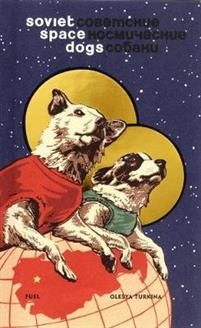This book is dedicated to the Soviet Space Dogs, who played a crucial part in the Soviet Space programme. These homeless dogs, plucked from the streets of Moscow, were selected because they fitted the programme's criteria: weighing no more than 7kg, measuring no more than 35cm in length, robust, photogenic and with a calm temperament. These characteristics enabled the dogs to withstand the extensive training that was needed to prepare them for suborbital, then for orbital space fights. On 3 November 1957, the dog Laika was the first Earth-born creature to enter space, making her instantly famous around the world. She did not return. Her death, a few hours after launching, transformed her into a legendary symbol of sacrifice. Two further strays, Belka and Strelka, were the first beings to make it back from space, and were swiftly immortalized in children's books and cartoons. Images of the Space Dogs proliferated, reproduced on everyday goods across the Soviet Union: cigarette packets, tins of sweets, badges, stamps and postcards all bore their likeness. This book uses these unique items to illustrate the story (in fact and fiction) of how they became fairy-tale idols. Monuments now commemorate their pioneering role in conquering the `final frontier': their heroism will never be forgotten.
This book is dedicated to the Soviet Space Dogs, who played a crucial part in the Soviet Space programme. These homeless dogs, plucked from the streets of Moscow, were selected because they fitted the programme's criteria: weighing no more than 7kg, measuring no more than 35cm in length, robust, photogenic and with a calm temperament. These characteristics enabled the dogs to withstand the extensive training that was needed to prepare them for suborbital, then for orbital space fights. On 3 November 1957, the dog Laika was the first Earth-born creature to enter space, making her instantly famous around the world. She did not return. Her death, a few hours after launching, transformed her into a legendary symbol of sacrifice. Two further strays, Belka and Strelka, were the first beings to make it back from space, and were swiftly immortalized in children's books and cartoons. Images of the Space Dogs proliferated, reproduced on everyday goods across the Soviet Union: cigarette packets, tins of sweets, badges, stamps and postcards all bore their likeness. This book uses these unique items to illustrate the story (in fact and fiction) of how they became fairy-tale idols. Monuments now commemorate their pioneering role in conquering the `final frontier': their heroism will never be forgotten.













